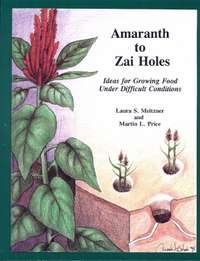Amaranth to Zai Holes
 AMARANTH TO ZAI HOLES; Ideas for growing Food Under Difficult Conditions (1996)
AMARANTH TO ZAI HOLES; Ideas for growing Food Under Difficult Conditions (1996)
Laura S. Meitzner and Martin L. Price
This is a book of practical ideas. It is written for people who help those who live and make their living under difficult conditions in the tropics and subtropics. What should a development worker do to assist a community? There are no simple answers, but there are many possibilities--plants, techniques, and technologies--which hold potential. For fifteen years, ECHO has sought out information on these ideas for the quarterly networking bulletin ECHO Development Notes (EDN). Many people have contributed their insights to share with our network of over 4000 people in 140 countries. If you are interested in improving the lives of small farmers, we welcome your active participation in our network.
This book is based on the first 51 issues of EDN. The ideas in EDN come from questions or experiences of field workers, the scientific research done in support of their work, and many newsletters from around the world which ECHO's staff monitor for worthy items. This collection is not intended to be a complete handbook. There are important topics which are not mentioned, and in many cases you are referred to other resources for background information or specialized details.
More and updated information is available in Agricultural Options for the Small Scale Farmer and in ECHO Publications.
Over 150 issues of EDN have now been published.
The complete Amaranth to Zai Holes can be downloaded here or download a selected chapter below.
ECHO library copies can be viewed on-site in Florida or Thailand. A 2001 Video about ECHO, produced by The Visionaries, can be viewed online.
| First | Second | Third | Fourth | Fifth | Last |
44 Issues in this Publication (Showing issues 4 - 1) Previous
Chart 11 - A Comparison of Ground Covers and Green Manures - 19-10-1996
All of the plants mentioned in this chart can be used as feed for animals. However, cutting them for feed limits their effectiveness as green manures and cover crops. The distinction between green manures and cover crops is minimal, and often the two words are used interchangeably. The following definitions show the difference in emphasis of the two terms. Green manure crops are those grown for the purpose of incorporation when the plant is fresh and green (thus high in nitrogen), resulting in soil enrichment and a greater water holding capacity. Ground cover crops grow vigorously to outcompete weeds and provide a good soil covering and mulch. These crops are also good for soil improvement and erosion prevention.



